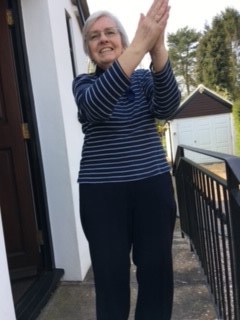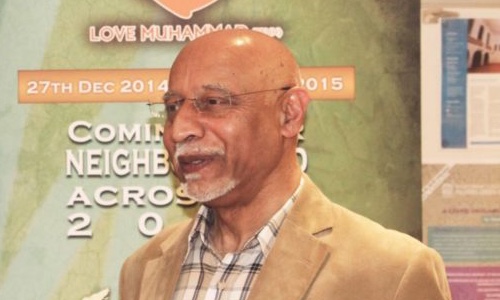This article was originally published in November 2020 for Inter Faith Week, which aims to raise awareness of different faith communities and strengthen relations.
We spoke to 5 older people about how their faiths have been affected by the ongoing coronavirus pandemic.
An estimated 63% of people aged 65+ in England and Wales say they have a religion. For many people who identify as part of a faith, their beliefs - and the community of people with whom they share those beliefs - are an important part of who they are and how they connect with the world.
However, in a year where our connections with the people and support systems we usually rely on have been fractured by lockdowns and social distancing, people’s faiths have also been impacted.
“For the wider community, it’s had a big impact,” says Radha, who is a practising Hindu. “Obviously, gatherings can’t happen any more as they would have done. My sister was the president of the Mauritian Association and she did a big prayer once a month; that's now cancelled.”
Painful changes
Coronavirus restrictions have forced places of worship to stop or limit services, with many moving to online worship. Weddings and funerals have been curtailed.
"Funerals have been something which have been really affected in our community, “ says Talat, 72, who is one of the founders of the Muslim Community Education Centre at the Palmers Green Mosque, London. “We do not cremate and we normally wash plus shroud the bodies before burial.But in these times, we could not wash the bodies and they had to be taken straight to the cemetery with limited numbers being able to attend. It was painful. Very, very painful.”

Two major Christian festivals have been impacted already, Easter and Pentecost, and now, Christmas might be thwarted.
Fears for festivals
Religious festivals and observances have not been spared either. In August, the Health Secretary, Matt Hancock, received criticism for reinforcing lockdowns in parts of Northern England the night before many muslims were due to celebrate Eid with their families - a move which was likened by some to ‘cancelling Christmas’. Now, as England enters a second lockdown, it’s likely that winter festivals such as the Sikh Day of Liberation Bandi Chhor Divas, Diwali, Hanukkah, Christmas and Kwanzaa will be very different for observers.
“I’m really sad now that we've got this second lockdown,” says Janet, 79, who is a practicing Methodist. “Particularly as we didn't have a proper Easter celebration in the churches. Two major Christian festivals have been impacted already, Easter and Pentecost, and now, Christmas might be thwarted. I'm just hoping that we will come out of lockdown by Christmas but, if we don't, we'll have to make the best of it. We’ll just have to demonstrate to the outside world that the church is not really closed, the church is still alive.”
Adapting to the ‘new normal’
Many faith groups have turned to digital technologies to allow them to connect with their communities and pray together. But that’s not always as easy as it sounds.
“All of our regular worship and all our regular activities had to be rethought,” says Doreen, 69, who identifies as Orthodox Jewish. Our synagogue was unable to move its Sabbath services and festival services online because we don't use technology on Shabbat so that was a huge problem for us. A lot of rabbis, supported by the professional staff at head office, began moving other services and communal activities online so that people could feel that they still had a link.”
Talat has noticed both positives and negatives from the move to online technology. “A positive impact of all of this has been for the older ladies. They are using technology I never expected them to be able to use. They’re having regular Zoom sessions with the education team and they’re loving it. OK, it’s not face to face, but at least it's virtually face to face over a screen. For the men, it’s been different. Men have a different style of communication. They are not as openly chatty as the ladies. For them, it’s been quite difficult.”
“No one knows what will happen going forward,” says Rajinder, 74, a Sikh. “But COVID is here and will be here in the future. We need to adapt, be sensible and support one another through love and being kind. Keep the faith, pray and meditate. God will look after us and we will get through this.”
Finding comfort and connection in uncertain times
As the UK heads into winter, many people - particularly older people - are feeling apprehensive. Lockdowns and social distancing have caused widespread loneliness and isolation. But could faith help counter these feelings?
“I think there have been lots of good things to come out of this situation,” says Janet. “A lot of people are trying to find ways that they can help. It’s been a great opportunity for people to show their love for each other and for their neighbourhoods. Whether that’s standing on somebody’s doorstep to have a conversation, sending little gifts, or phoning up someone you know is on their own.”
Doreen agrees: “I think we have to find more and different, innovative ways of making people feel connected and helping people to overcome the loneliness and despair that they're feeling now. It’s going to be much harder in the winter. We have to do more and be better to contact those who feel particularly isolated.”

Lack of knowledge leads to fear. The less you understand, the more stories your mind conjures up.
The importance of Inter Faith Week
Talat believes it’s vital for people of all faiths, and none, to learn more about each other. “Lack of knowledge leads to fear. The less you understand, the more stories your mind conjures up.”
Rahda agrees: "To understand someone else’s religion and faith, means that you get rid of any assumptions or misunderstanding. I wouldn’t criticise anyone else’s religion because, at the end of the day, we all pray to one God. Just do good to people. Whether they’re atheist or a believer, just do good things for other people.”
“We are all in the same boat with a lockdown and COVID,” says Rajinder. “We are all part of one human race and we should learn from one another’s faith and belief, and celebrate them.”

